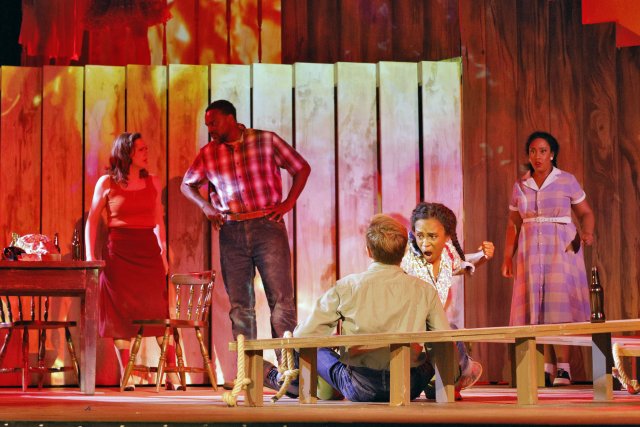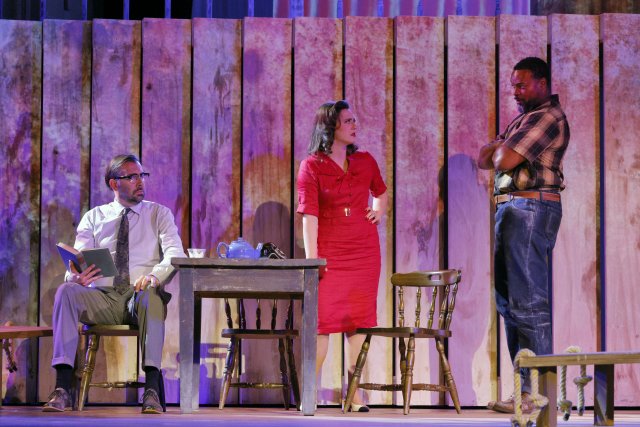Bulrusher - The Opera
World Premiere Pulitzer Finalist Play by West Edge Opera
By: Victor Cordell - Aug 05, 2024
Imagine as a young child realizing that you look significantly different from everyone else around. And then you find out that the reason is because you come from a different tribe than the others. Finally, you learn that your people have been abused in many ways by the tribe that surrounds you. The good news is the notion that a majority population usually doesn’t feel threatened by a minority of one middle-aged man and one young girl, raised by a respected white schoolteacher, so that bigotry is largely suppressed.
Such is the karma of Bulrusher, like a black, female Moses, found in a basket among river reeds near the all-white, northern California town of Boonville. Not until she is 18 years of age in 1955 does a woman arrive in town from Alabama who looks like she shares similar racial background. Bulrusher’s story was first told in Eisa Davis’s eponymous 2007 Pulitzer-finalist play.
West Edge Opera has commissioned an opera version composed by Nathaniel Stookey that holds well to the story line and offers poignant entertainment with lush music performed by a distinguished cast of artists who bring great voices and fine characterizations to their roles. Action in Act 1 is somewhat slow paced, but Act 2 has enough moral lessons, status changes, denouements, and trainwrecks among various groups of characters to easily redeem the narrative. While most operas center on one central clash, “Bulrusher” manages the dramatic tension of these several conflicts effectively.
Shawnette Sulker embodies the role of Bulrusher singing with a sterling soprano, convincing in affect, and even giving the petite appearance of a youth. This foundling stands out in her community not just because of color, but because she has the power to read water to tell the future for others, from knowing tomorrow’s weather to telling a man that his undisclosed gonorrhea is going to clear up.
Bulrusher also stands apart as a loner, since her foster father, the reserved and upstanding Schoolch (performed by towering and commanding bass Matt Boehler), demanded that she speak standard English. She doesn’t “harp the ling,” that is, speak Boontling which was the real patois of the locals in that era. The libretto is full of the town’s unique vocabulary (ricky chow for having sex or golden eagles for underwear) and colorful phrases like “geechin gets me scottied” (penetration makes me hungry!).
The ensemble of other characters comprises a diverse lot. Madame (smooth mezzo Rebecca Cuddy) is the somewhat mysterious no-nonsense business woman who prides herself on moral character, yet happens to be the proprietress of the local brothel. Logger (Kenneth Kellogg – another towering and commanding bass) is the one black man in the community, who is also a regular customer of the brothel.
But Bulrusher’s most untried experiences are with her peers. Boy is played by Chad Somers who brings not only a fine tenor voice effective in a wide range, but he captures the contradictions of presumptuous masculine entitlement with gawky socialization. Boy was a classmate of Bulrusher’s who had ignored her through school but has now declared his interest in her to less than enthusiastic and sometimes volatile reception.
And finally, Vera (Briana Hunter, a mellow yet powerful lyric mezzo) has come to town from Birmingham to find her long lost uncle Logger and look for work to save for college. The sheltered Bulrusher comes of age through Vera’s presence, learning of hurt, love, and life in the outside world.
The composer’s score is largely mellifluous but with sufficient dissonance to add some edge. Attractive set pieces abound including brief duets and interesting use of the chorus offstage and in echoing mode. The orchestral component serves the singers harmonically and rhythmically. Rarely does it carry the melody except with a few standout phrases that draw on folk and pop idiom. The orchestra is well conducted by Emily Senturia and is generally restrained and beautiful. It is however very strings dominant, and the slow pace of the score seems exacerbated by that configuration. In addition, when intermediate climaxes arise, the orchestra lacks the brass power to provide maximum impact.
The one other area of concern is the staging. The company has gone with a minimalistic, abstract set with muted and mottled projections mostly of slowly moving water and other depictions of nature. Several large, curved benches on stage largely lack function, and they are moved into new locations during scene breaks with questionable purpose. This opera is strongly rooted in time and place, which particularly resonates with a Bay Area opera audience. Even if economy measures drive the set design, projections can be used to immerse the audience in the ambiance of Mendocino County in the ‘50s - weathered wood-sided buildings; townscapes; advertising and business signs of the period; and the bucolic environment of apple orchards, vineyards, redwood forests, rivers, and the Pacific Ocean.
“Bulrusher,” a world premiere, with music by Nathaniel Stookey and libretto by Eisa Davis & Nathaniel Stookey is based on Davis’s play of the same name, is produced by West Edge Opera and plays at Oakland Scottish Rite Center, 1547 Lakeside Drive, Oakland, CA through August 18, 2024.






